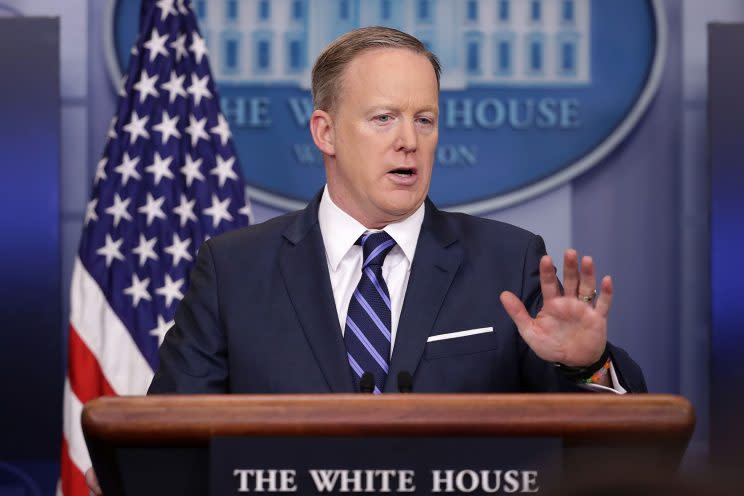White House faces questions about Syria policy after suspected chemical attack
WASHINGTON — The White House released a statement on Tuesday blaming the regime of Syrian President Bashar Assad for a suspected chemical attack that reportedly left dozens dead in that country — and blaming former President Barack Obama for not doing more to get rid of Assad. White House press secretary Sean Spicer read the statement in his daily press briefing on Tuesday, where he also faced questions about the Trump administration’s position on Syria.
The reported chemical attack came on the heels of a series of comments by Spicer and other officials last week indicating that President Trump is open to having Assad remain in office, a policy Spicer said reflected the “political realities” in the country. Syria has been torn apart by a civil war since 2011, and the chemical attack occurred in an area held by rebels fighting Assad’s regime. According to local reports, there were dozens of victims, including children, who displayed signs of chemical poisoning. The recent remarks from the Trump administration are a marked departure from the posture of his predecessor, Obama, who repeatedly said Assad must go and provided training and equipment to anti-Assad rebels. The Obama administration also called for the Syrian leader to be prosecuted for war crimes. However, the previous administration did not commit American military power to ousting Assad.
Spicer started the briefing by reading the White House’s statement on the attacks, which was sharply critical of Obama’s handling of the situation in Syria.
“Today’s chemical attack in Syria against innocent people, including women and children, is reprehensible and cannot be ignored by the civilized world. These heinous actions by the Bashar al-Assad regime are a consequence of the past administration’s weakness and irresolution, period,” said Spicer. “President Obama said in 2012 that he would establish a quote-end-quote ‘red line’ against the use of chemical weapons and then did nothing, period. The United States stands with our allies across the globe to condemn this intolerable act.”
Speaking to reporters last week, Secretary of State Rex Tillerson suggested the Trump administration would not focus on ousting Assad. Tillerson said Assad’s “longer-term status” should be “decided by the Syrian people.” Nikki Haley, the U.S. ambassador to the United Nations, was even clearer when she told reporters last week that the administration’s “priority is no longer to sit there and focus on getting Assad out.” Spicer echoed those comments in a briefing last week where he described Assad as part of a “political reality we have to accept.”
In a statement released Tuesday afternoon Tillerson further called on Russia and Iran, both of whom provide support to Assad’s regime, to help prevent further such atrocities.
“We call upon Russia and Iran, yet again, to exercise their influence over the Syrian regime and to guarantee that this sort of horrific attack never happens again,” Tillerson said. “As the self-proclaimed guarantors to the ceasefire negotiated in Astana, Russia and Iran also bear great moral responsibility for these deaths.”
In Tuesday’s briefing, the first question came from Fox News Radio’s Jon Decker, who asked Spicer for “clarity” on the administration’s position on Syria following these recent remarks.
Spicer pointed to his opening statement, then suggested the statements by Tillerson and Haley “speak to the political reality of the situation in Syria.” He said there had been “opportunities in the past … to look at regime change,” but there is now a “fundamentally different landscape.”
Spicer also said Trump is conferring with his team and allies, but does not want “to telegraph what we’re going to do.”
“There is not a fundamental option of regime change as there has been in the past. I think we would look like, to some degree, rather silly not acknowledging the political reality that’s in existence here and that what we need to do is fundamentally do what we can to empower the people of Syria to find a different way,” said Spicer.

Yahoo News then asked Spicer if he was concerned that there’s “any correlation” between the alleged chemical attacks and the views enunciated by Tillerson and Haley. Spicer insisted that the change in tone reflected an assessment of the power balance in Syria, not a warmer attitude toward Assad.
“It’s not a comfort level with Assad. I think it’s the political reality,” said Spicer. “That being said, I think the idea that someone would use chemical weapons on their own people including women and children is not something that any civilized nation should sit back and accept or tolerate. And I think that that is what we are making very clear today.”
Yahoo News pressed Spicer by noting that Haley’s comment in particular was “clearly a change in posture” and asking again whether the White House believes there is a correlation between this shift and “increased brazenness” from Assad.
“I don’t,” said Spicer.
He added that the president is “extremely alarmed” by the reported chemical attack.
“He continues to meet with his national security team, and I think there will be further discussions around the globe with our allies as far as the appropriate action,” Spicer said.
Assad’s regime has been supported by Russia. In the past, Trump urged Obama not to attack Syria. During last year’s presidential campaign, Trump called for focusing on toppling the jihadist group the Islamic State, which has taken territory in Syria, rather than Assad. That mirrors Russia’s public position, though analysts have alleged that Russia’s airstrikes have focused on other rebel groups rather than the Islamic State.
Spicer was asked if the White House was concerned about the possibility of Russian involvement in the chemical attack. He again pointed to his prepared statement condemning Assad.
“The statement is very clear as far as who we believe is to blame and how we believe we’re reacting to it,” said Spicer.


